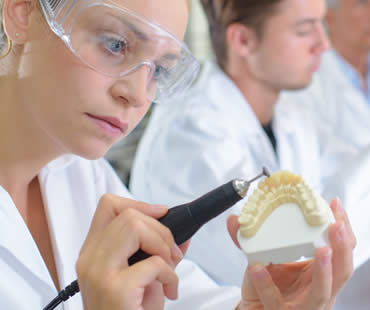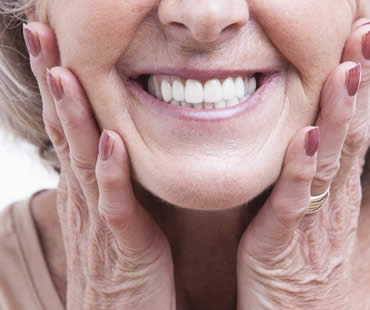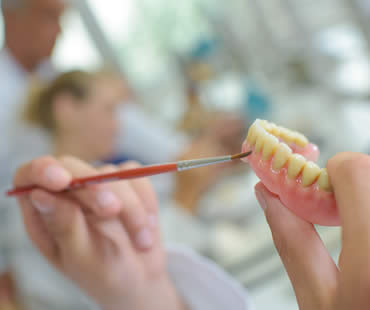
Dentures have been around a long time as a way to restore smiles plagued by missing teeth. They provide a solution for people who want to smile, talk, and eat as normally as possible. Unfortunately, removable dentures aren’t without issues. They can become loose or shift, making it uncomfortable to eat and talk. Messy denture adhesives are bothersome and ineffective for some patients. Therefore, advancements in dental technology have developed the option of permanent dentures.
What are permanent dentures?
Permanent, or fixed, dentures are suitable for patients missing one, two, or more teeth. The appliance is made up of a row of crowns or artificial teeth, which are connected together and the framework is supported by dental implants. The implants act like natural tooth roots, and the permanent dentures create a bite similar to natural teeth.
What are the benefits?
Fixed dentures definitely offers some advantages to removable ones. The need for messy adhesives is eliminated, and you don’t have to worry about loose or ill-fitting dentures affecting you. The force of your bite is also improved, so you can eat all kinds of foods without concern. Because a permanent upper denture doesn’t cover the roof of your mouth, your ability to taste and enjoy food is not sacrificed. This kind of denture stays in place for normal oral hygiene, so there are no special cleaning or soaking requirements. If properly maintained, permanent dentures can last for many years or even a lifetime.
Are there any disadvantages?
Permanent dentures are susceptible to oral problems like infection or inflammation because they are not removable. Also, it is possible that the crowns may require replacement in 10 to 15 years.
We treat patients from Fernandina Beach and the surrounding area

No matter how much you want to preserve your real teeth, it’s not uncommon for people to lose teeth. It may occur with age, decay, gum disease, or injury. If this happens to you, there’s no reason to go through life missing teeth in your smile. It’s better to quickly see your dentist for replacement teeth, so that you avoid shifting of your remaining teeth, speech problems, or saggy facial muscles. One solution that your dentist will likely offer to restore your smile is dentures. Here are some tips to help you select the right dentures for you.
Dentist
An important step in the process of getting dentures is making sure you have a qualified and experienced dentist treating you. Most dentists provide dentures as part of their services, or you may choose to go to a prosthodontist. This type of specialist focuses on restorative dentistry. No matter who you choose, make sure that you are confident you will get dentures that meet your specific goals and needs.
Type of dentures
There are several types of dentures available, each with their own attributes. These are the main kinds:
- Full dentures – an acrylic appliance that replaces all of the teeth in your upper jaw. These are functional and replicate your real teeth, and are usually comfortable when fitted correctly.
- Partial dentures – these replace one or two missing teeth using a dental arch. Partial dentures are made of acrylic, metal, plastic, or a combination of these materials. These are attached with a clip that holds them in place in your mouth.
- Permanent dentures – these dentures are permanently attached and require almost no maintenance. They are the costliest of the types of dentures.
Color
Dentures are available in various shades of white so that you can select the color that is most natural for you. Be careful about choosing the brightest white color, which may look unnatural compared to the color of your real teeth. Your dentist will help you find a neutral color that looks best with your smile and complexion.
Our dental office is located in Fernandina Beach

Dentures have improved dramatically over the past several years. Whether it’s your first set of dentures or your fifth set, you probably have questions. Below are some commonly asked questions and answers about dentures:
- Will dentures change how I look? Today’s dentures are personalized to your mouth, making their appearance more natural than ever. Dentures also support your cheeks and lips, making you look years younger.
- Will dentures change how I feel? After a period of adjustment, dentures should make you feel more confident than ever.
- Will dentures alter my speech? While speaking may be difficult initially, with practice, your speech should quickly return to normal. Practicing reading and counting out loud will help to speed up the adjustment.
- Will dentures affect how I eat? Eating may take some practice, and you should start with a soft food diet while you adjust to the differences between eating with your natural teeth and dentures. Take small bites and try to chew on both sides of your mouth at the same time. Avoid hard, crunchy or chewy foods that can damage your dentures.
- How do I care for my dentures? Clean dentures daily, brushing immediately after every meal if possible. Use a soft brush and gentle cleanser, taking care to avoid hard abrasives. Be careful when they are out of your mouth not to drop them or clean them on hard surfaces.
- Once I have dentures, will I still need to see the dentist? Regular dental examinations and professional denture cleanings are vital to maintaining your oral health. Have your dentist periodically check the fit of your dentures to ensure they are comfortable and last for as long as possible.
- When will I need to replace my dentures? With care, dentures typically last 5-10 years. Because your mouth continues to change shape as you age and denture teeth wear down, you should have them checked yearly to avoid any significant problems.
Consult with your dental professional about any additional questions or concerns you may have about your future with dentures and your potential for a bright, new smile.
If you need a dentist in Fernandina Beach contact us today

Thanks to advances in dental technology, dentures are more natural looking and comfortable than ever before. If you are one of the many adults wearing dentures to replace missing teeth, there are several do’s and don’ts you will want to follow to ensure they maintain their fit and your oral health:
- Do take your dentures out before going to bed, allowing your mouth tissues to rest from wearing them all day.
- Don’t let your dentures dry out. Soak them in mild denture solution or water while you sleep.
- Do clean them daily with either a mild detergent or special denture cleaning solution and a soft-bristled brush.
- Don’t soak them in very hot water, as this could cause them to warp, and they will no longer fit properly.
- Do handle them with care. Dropping your dentures or treating them with strong cleansers or harsh brushes can do permanent damage.
- Don’t neglect your oral care for the rest of your mouth. Even patients with a full set of dentures need to take care of their gums, and if you have partial dentures you should continue to brush and floss your remaining teeth regularly.
- Do pay attention to changes in the fit or feel of your dentures. Problems with fit can lead to irritation and discomfort, and could also be an indication of gum disease.
- Don’t try to adjust or repair your dentures on your own. If your dentures are ill-fitting or damaged in any way, schedule an appointment with your dentist to have them evaluated.
- Do continue to see your dentist for regular checkups to help maintain your best oral health and check your dentures for fit and function.
If you are missing all or some of your teeth, dentures can greatly improve both your appearance and the quality of your life. By following these simple guidelines, you can maintain the beauty and functionality of your dentures for many years.
We treat patients from Fernandina Beach and the surrounding area

You may expect you won’t need dentures because you take good care of your teeth. However, dentures are more prevalent than you may think. The number of adults in the United States needing dentures is expected to increase from 33 million in 1991 to 37 million in 2020. If you are wondering how likely you are to keep your teeth, here are some warning signs that may indicate dentures are in your future.
- You don’t visit your dentist twice a year for regular checkups and routine cleaning. Gum disease and tooth decay are the leading causes of tooth loss; therefore, it is critical to be proactive with dental care to prevent problems that could cause the need for extraction.
- You have gums that are swollen, tender, red, or bleeding which are indications of periodontal disease. Left untreated, gum disease is the primary cause of adult tooth loss.
- Your teeth have become loose, are shifting, or have developed wider gaps between them that can indicate bone loss from gum disease.
- You have severe tooth pain that could be a sign that decay has progressed and is attacking the nerve at the center of the tooth. Once tooth decay has advanced, it is more likely your tooth will need to be removed.
- You are already missing several of your teeth. If you are missing more than two teeth, it is important to replace them with some sort of prosthesis to keep pressure off of your remaining teeth.
- It is difficult for you to eat hard candy or chewy foods, which may indicate a cracked tooth, cavities, or gum disease.
- If you suffer from recurring stomach aches or indigestion, it may be a sign of dental problems. When you can’t chew properly, you end up swallowing larger pieces of food which is hard on your digestion.
Tooth loss does not happen overnight. With proper oral hygiene and regular dental visits, you may be able to avoid or delay the need for dentures in your future.
We look forward to seeing you in our Fernandina Beach dental office

Denture technology has come a long way since the days of George Washington and his wooden teeth. Unfortunately, people still lose teeth for a variety of reasons including periodontal disease, trauma, and decay. Missing teeth make talking and eating difficult, and can ultimately cause sagging facial muscles. However, with today’s advances in technology it is more possible than ever to replace those lost teeth with natural and comfortable dentures.
Complete dentures cover both upper and lower jaws. The options for complete dentures range from immediate dentures to highly customized implant dentures. Immediate dentures are pre-made and available at your dentist’s office. They are not custom fitted and are set into gum sockets immediately upon removal of your teeth. While these offer the convenience of walking immediately out of the dental office with your new teeth in place, once gum tissue heals and swelling reduces they may shift and become loose. This issue requires follow-up visits for your dentist to make adjustments. People with immediate dentures may also have difficulty speaking, or experience a “clicking sound” when talking.
Conventional full dentures can be made 8 to 12 weeks after tooth loss or removal. Once the gums have healed, your dentist takes a series of impressions of your mouth to be sent away to a dental lab to create your dentures. This process may require multiple visits to your dentist to ensure a proper fit and correct bite. While this process takes longer and is more involved than immediate dentures, you will achieve a more secure and personalized fit. Both conventional and immediate dentures require the use of denture adhesives to keep them securely in place.
For an even more custom, natural looking and secure denture option, implant dentures are an excellent alternative. With implant dentures, small implants are placed in the jaw where they heal in place surrounded by the bone. The denture then snaps into the implant with attachments under the denture. These attachments keep the denture stable, providing more comfort and confidence. You do not have to worry your dentures will slip or fall out while you are eating, talking, or laughing. Implant dentures do not require the use of any denture adhesives.
Talk to your dental professional to determine the best use of denture technology to ensure many years of a confident and comfortable smile.
We treat patients from Fernandina Beach and the surrounding area







